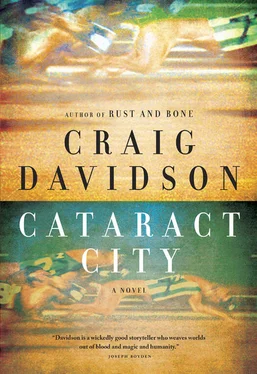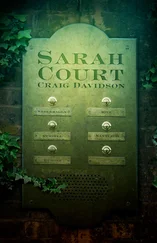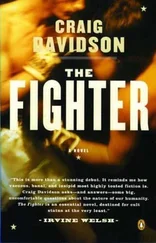And then—
One time at the Bisk someone dropped a screw into the gears of an industrial mixer. It pinged around the machine housing before sticking between the teeth of two huge tumblers. Nine times out of ten it wouldn’t have stuck: the gears would have spat it out or snapped it in two. But it got stuck fast and the gears seized — and the pent-up torsion tore the entire machine to pieces. Gears stripped off spindles and rotors burned out. Busted gears punched through the housing. The machine was a smoking ruins.
That was what I thought of watching Dolly break apart.
The simplest explanation is that Dolly’s rear right paw snagged in her jersey. A thin nylon strap ran across her belly; Harry had snugged it tight but it must have loosened. Dolly’s paw got under the strap, where it was trapped between it and her stomach.
It could’ve happened a million other times and nothing would’ve come of it. Maybe it was the way she brought her leg down. Maybe it was the angle of her spine. When Dolly flexed into her next stride her foot remained snagged on the strap. Her leg kept going. The strap had no give — they aren’t designed that way. Dolly ran on the unshakable belief that her leg was going to come down again; she put all her weight into that belief, and in doing so she busted her own leg.
It went just like Harry said: a stick of spaghetti.
Her body flung forward, her leg flapping behind like a ribbon in the wind. She hit the track and unravelled.
My hips were already clearing the rail as War Hammer crossed the finish line. I sprinted to where Dolly lay in an awful tangle, snorting like she had pollen in her nostrils. She rolled onto her side and got up. Maybe I’d seen it all wrong — maybe she’d just twisted her limb? She put her right leg down to see if it might work. It hung like a limp thing with the paw twisted off at a horrible angle.
She lifted it up again — lifted her haunches which lifted her dangling leg — then tried to put it back down, lifting and putting it down with puzzled helplessness.
“You’re going to be all right, girl,” I said, because in my heart I still hoped.
I pulled Dolly into a hug, stroking her head like a father trying to soothe the fever of a sick child. Her body softened into mine and I knew some part of her acknowledged the situation or gave up. Or maybe she was just sick of running.
The following hours passed in a haze. I remember Ed taking Dolly’s muzzle in her hands and how Dolly licked her face crazily — startled by Ed’s tears, maybe. And I remember Harry’s crestfallen expression, tears hanging in the cups of his eyelids as he said: “I should have tightened those straps. Should have known she’d run that jersey right off her back.”
I said there was no faulting anything he’d done, but I could tell Harry didn’t accept it. Some men can’t.
I remember barging into the vet’s office as they were closing. The vet injected Dolly with something that made her eyelids roll down like shutters before testing the leg with his fingers, feeling all the places where it had been ruined. He made a long incision down Dolly’s leg and as soon as it was opened shards of bone from her shattered leg simply fell out; they looked like crushed glass.
He told us the best he could do was amputate — that, or euthanize her. I almost strangled the man.
Ed and I smoked too many cigarettes while the vet operated. Ed cried on and off. When it was over Dolly hobbled out on three legs with a plastic cone around her head, woozy from the anaesthesia.
On the drive home she snoozed on Ed’s lap, her chest rising and falling in the moonlight that fell through the windshield. An immeasurable weight lifted from my own chest.
There are things I didn’t see, but I do know they happened. I know that War Hammer died shortly after the race from whatever toxic brew Drinkwater had shovelled into her. Owe told me that she’d staggered into the finishing pen, turned a few wonky circles and collapsed. He also told me he’d handed Drinkwater what we owed him — a bet was a bet — and that Drinkwater stuffed the envelopes into his pocket and walked to the parking lot.
Harry and Owe buried War Hammer in the soft loam along the river, five hundred yards behind Derby Lane. “You got to bury them deep,” Harry said. “Otherwise the shore freezes in the winter and they get spat up out of the earth in the spring thaw.” When Owe asked how he knew that, Harry said simply, “I’ve buried a lot of dogs, son. Only a few of them my own.”
Dolly never quite found her old footing: she could walk just fine, a funny little hop-step, and developed strong shoulders from putting more weight on them. Ed called her Tripod. She even became a little fat, like an athlete gone to seed. When Ed and I were still together, we’d take her for walks in the park. Ed would toss a tennis ball. Sometimes Dolly would tear after it and I’d see her body drop into that old stance, her belly nearly brushing the clipped blades of grass. But then she seemed to sense it, too, that natural runner rearing up inside her. She shut it down to a trot, no longer wishing to access that old aspect of herself.
I’d never say I was happy for what happened that night at Derby Lane. The sight of Dolly flipping end over end … sometimes it’ll pop into my mind and I’ll shudder. But here’s something I’ve never told anyone: the accident made Dolly more touchable. Afterwards, I could hold her — just for a few minutes, but that was something. She allowed me to show her love and accepted it as much as her nature allowed. Her breath would fall into a calm rhythm as I stroked her coat. That nub of bone poking my thigh … it always wrecked me. But then I would feel her big heart beating at almost the same tempo as my own and think: Maybe it was for the best .

“WHAT ARE YOU STILL DOING HERE?”
I craned my head over my shoulder and saw the red-haired girl in the rubber boots. The girl who’d been so unimpressed with my rock-skipping skills.
“I’ve been watching from my window,” she said, hooking her thumb at her apartment block. “You’re standing here like a zombie.”
The wind gusted, blowing ancient litter around the Derby Lane lot. The door of the Winning Ticket Lounge blew open and banged shut on its rusted hinges, issuing a thin squeal. How long had I been standing there? Too long for the girl’s taste, clearly.
“I was thinking.”
“About what?”
“Personal stuff.”
The girl unhinged her jaw, letting her eyes roll back. “Laaaame.”
I bristled, aware that she was a child but unable to help myself. “You’re not very nice, you know. Not as long as I’ve known you.”
“We just met,” she said evenly.
I kicked a rock, sent it skittering across the tarmac. “Well, anyway. I’d better get going now.”
“You’re too sensitive.” The girl set her hands on her hips in a schoolmarmish gesture. “This city is going to eat you alive.”
I waved goodbye to her and walked down the Parkway, heading towards Clifton Hill. Edwina and I used to walk Dolly down here sometimes, but I hadn’t seen either of them in nearly eight years. I wouldn’t be seeing them any time soon, either.
As I walked, I thought back to that night at Derby Lane — those fleeting moments on the homestretch when Dolly almost flew. I used to see her in a dream, which replaced the one with the hooks and screws. In that dream she was perfect, yet never more so than she was that night. She lived so well in that dream simply because she really could have stepped right out of it, blitzing down the backstretch like coiled thunder.
In that old dream Dolly scorched the earth with such fierceness that I swear sparks snapped off her paws. No earthly creature was meant to go that fast, but she did . Strange wonder she didn’t burst into flames. In the last few seconds of her racing career Dolly broke free of physics. She broke free of my understanding of them anyway, and in that way she entered the dream.
Читать дальше













